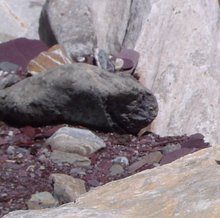Did you read any striking lines in K's books? You can propose to put it up here (include the reference please).
WSB: Looking through the books of K in my shelf late in the evening and reading some pages I do see so many striking lines; here is one:
'What will change man? .. Certainly not by an outside agency. Man has to face it, not avoid it, and examine it without asking for any aid; he is master of himself. He has made this society, he is responsible for it, and this very responsibility demands that he brings about a change in himself. But very few pay attention to all this. For the vast mass of people, their thinking is so utterly indifferent, irresponsible, seeking to filfill their own selfish life, sublimating their desires but still remaining selfish. .. One has to look at this. And you are the only one who can change yourself and society in which you live. That is a fact, and you can't escape from it..'
(K in 'K to himself' p 113-114)
So change is there when we face it and examine it without aid. I am the only one who can change myself and the society in which I live. Why? Because it is my resposnsibility.
WSB: Looking in one of K's books here are some lines I marke years ago. 'When the content of consciousness with its experiences, demands, its cravings for some new, including its craving for freedom from the known, has completely come do an end, then only does the other quality come into being. The former has a motive; the latter has no motive.. Motive is the known. .. when there is no movement of recognition, of experiencing, of motive, freedom from the known takes place .. when the brain , your mind is completely still, you don't see the still mind.. if you know it it is not still.' (K in 'Exploration into insight' p 32-33)
Subscribe to:
Post Comments (Atom)


2 comments:
Looking in one of K's books I unerlined some lines years ago.
'When the content of consciousness with its experiences, demands, its cravings for some new, including its craving for freedom from the known, has completely come do an end, then only does the other quality come into being. The former has a motive; the latter has no motive.. Motive is the known. .. when there is no movement of recognition, of experiencing, of motive, freedom from the known takes place .. when the brain , your mind is completely still, you don't see the still mind.. if you know it it is not still'
K in 'Exploration into insight' p32-33
(from K&C yahoo group)
The Core of the Teachings
The following statement was written by Krishnamurti himself
on October 21, 1980 in which he summarizes the teachings.
It may be copied and used provided this is done in its
entirety. No editing or change of any kind is permitted. No
extracts may be used.
-----------------------------------------------------------
"The core of Krishnamurti's teaching is contained in the
statement he made in 1929 when he said: 'Truth is a
pathless land'. Man cannot come to it through any
organization, through any creed, through any dogma, priest
or ritual, not through any philosophic knowledge or
psychological technique. He has to find it through the
mirror of relationship, through the understanding of the
contents of his own mind, through observation and not
through intellectual analysis or introspective dissection.
Man has built in himself images as a fence of security -
religious, political, personal. These manifest as symbols,
ideas, beliefs. The burden of these images dominates man's
thinking, his relationships and his daily life. These
images are the causes of our problems for they divide man
from man. His perception of life is shaped by the concepts
already established in his mind. The content of his
consciousness is his entire existence. This content is
common to all humanity. The individuality is the name, the
form and superficial culture he acquires from tradition and
environment. The uniqueness of man does not lie in the
superficial but in complete freedom from the content of his
consciousness, which is common to all mankind. So he is not
an individual.
Freedom is not a reaction; freedom is not a choice. It is
man's pretence that because he has choice he is free.
Freedom is pure observation without direction, without fear
of punishment and reward. Freedom is without motive;
freedom is not at the end of the evolution of man but lies
in the first step of his existence. In observation one
begins to discover the lack of freedom. Freedom is found in
the choiceless awareness of our daily existence and
activity. Thought is time. Thought is born of experience
and knowledge which are inseparable from time and the past.
Time is the psychological enemy of man. Our action is based
on knowledge and therefore time, so man is always a slave
to the past. Thought is ever-limited and so we live in
constant conflict and struggle. There is no psychological
evolution.
When man becomes aware of the movement of his own thoughts
he will see the division between the thinker and thought,
the observer and the observed, the experiencer and the
experience. He will discover that this division is an
illusion. Then only is there pure observation which is
insight without any shadow of the past or of time. This
timeless insight brings about a deep radical mutation in
the mind.
Total negation is the essence of the positive. When there
is negation of all those things that thought has brought
about psychologically, only then is there love, which is
compassion and intelligence."
Post a Comment